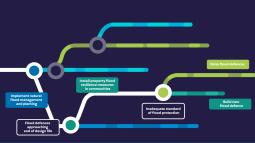Local Authority Rapid Adaptation Pathways Assessment (RAPA) - pilot locations announced
ADEPT and the Environment Agency are pleased to announce the three successful rapid adaptation pathway assessment (RAPA) pilot locations. These will be Wiltshire, West Sussex and Severnside, South Gloucestershire Council & West of England Mayoral Combined Authority. The locations chosen offer us the ability to focus on different issues and risks and will help us to gather as wide a range of information as possible.
The adaptation pathway approach allows for timely and informed decisions, ensuring that resources are invested effectively. It allows decision makers to act even under climate uncertainty, identifying what actions can be taken now and to plan and adapt for climate hazards and changes in the future.
RAPAs are 'high-level' adaptation pathways developed in workshop settings. They use the expert judgement of participating stakeholders to identify thresholds and actions, using maps and clearly defined data.
The RAPA toolkit and guidance that we are developing will focus on flood and coastal erosion risks and is aimed at local authorities, allowing them to deliver a basic rapid adaptation pathways assessment approach in their places and partnerships.
The three pilot locations will host workshops to trial the RAPA tool kit, ultimately providing valuable information and generating appropriate guidance that can be used by other authorities.
Marlborough, Wiltshire Council
This RAPA focuses on the market town of Marlborough. Marlborough suffered fluvial flooding in January 2024, resulting in the evacuation of a number of vulnerable residents. The RAPA pilot in this location will focus on supporting the local community to develop a long-term strategy that effectively manages the increasing flood risk resulting from climate change. Primary objectives will be gathering valuable data and working with the community to decrease vulnerability.
West Sussex
The RAPA in West Sussex will focus on working with local communities and key stakeholders within the Adur & Worthing district. The aim is to better understand flood risks due to climate change from a range of sources including coastal, fluvial, and surface water flooding, as well as coastal erosion. Through this process, the RAPA will develop a long-term strategy to manage these risks, taking into account the unique and interconnected rural/urban and coastal/inland relationships present in the county.
Severnside, South Gloucestershire Council & West of England Mayoral Combined Authority
The primary focus of this RAPA will be the risk of coastal flooding and will help to explore and plan for the projected impacts of a rising sea level over time. The risk to communities & critical infrastructure including those associated with waste, energy generation, distribution and storage, and transport will be evaluated and form part of the essential guidance for LAs to manage and prepare for the impacts of coastal flooding now and in the future.
Instances of flooding are increasing, and the RAPA approach is a dynamic and forward-thinking pilot scheme that aims to empower local authorities to meet this challenge. Providing valuable information, guidance and a robust toolkit to enable informed decision-making that mitigates the negative impact of flooding due to climate change.

